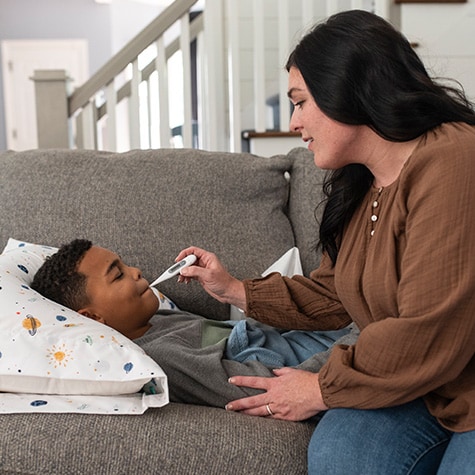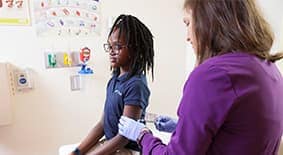COVID is a novel coronavirus that emerged in 2019 and quickly spread worldwide.
Coronaviruses are a family of viruses that commonly infect animals but can infect humans, too. They usually attack the upper respiratory tract—nose, sinuses and throat. The coronaviruses get their name from the crown-like spikes on their surface, visible under a microscope (“corona” means crown in Latin). Some types of coronaviruses cause mild, cold-like symptoms, while some infections from coronaviruses like SARS or MERS can be more severe.
Here are some helpful resources from the CDC and the Georgia Department of Public Health to help keep your family safe during COVID-19.
Symptoms of COVID range from very mild to more severe and in some situations, fatal. COVID in most healthy children causes mild symptoms and does not require hospital care.
Symptoms of COVID-19 may include:
- Fever
- Cough
- Congestion or runny nose
- Shortness of breath or difficulty breathing
- New loss of taste or smell
- Refusal of liquids with decreased urine frequency
- Crying without the ability to be consoled
- Fatigue
- Sore throat
- Nausea or vomiting
- Diarrhea
- Muscle or body aches
- Headache
Symptoms may appear two to 14 days after infection. In children, the most common symptoms are fever, congestion and cough.
When should my child see a doctor for COVID-19 symptoms?
Most children with COVID have mild symptoms and can safely recover at home without seeking medical care. If your child has concerning symptoms, call your doctor or pediatrician to discuss next steps before going to a hospital, emergency department or urgent care.
Note: If your child has a fever or cough and does not need medical care, we highly recommend that your child stay home until the fever and other symptoms are gone for 24 hours.
If your child is having difficulty breathing, call 911 or go to the nearest emergency department.

How to spot common illnesses during cold and flu season
Though they have some symptoms in common, here’s how to tell the difference between COVID-19, the flu and the common cold.
learn more
This content is general information and is not specific medical advice. In case of an urgent concern or emergency, call 911 or go to the nearest emergency department right away.
What are the different types of COVID-19 testing?
The two most common COVID-19 diagnostic tests are:
- Polymerase chain reaction (PCR) test: This is a molecular test that looks for the genetic material of the SARS-CoV-2 virus and is often referred to as the gold standard of COVID-19 tests. It is the most sensitive test available but may take time before the results are available.
- Antigen test: Also called a rapid test, this test is less sensitive, but results are available in a few minutes.
Another kind of testing may help determine whether you have protection to SARS-CoV-2:
- Antibody/serologic tests: These tests check your blood by looking for antibodies to SARS-CoV-2, which can be present after an infection or a COVID-19 vaccination. Some serologic tests can tell the difference between protection after infection and protection after COVID-19 vaccination.
What are antibodies?
Antibodies are proteins that help fight off infections and usually provide protection against infection and/or having symptoms from the infection (immunity).
Where can I get my child tested for COVID?
At-home tests are available for purchase in most pharmacies.
Everyone 6 months of age and older should get a COVID-19 vaccine.
At Children’s, we are committed to the health and safety of our patients, their families and our staff. We know that you have many questions about the COVID vaccines and encourage you to speak with your pediatrician about vaccine availability or if the vaccine series is right for your child.
Vaccine Finder
Visit the vaccine.gov vaccine finder for more information or to find a COVID vaccine near you.
Find a Vaccine via Text Message
Text your zip code to 438829 (GETVAX) for English or 822862 (VACUNA) for Spanish.
Caring for a Child With Covid-19
We recommend:
- Staying home and avoiding being around others as much as possible.
- Keeping the ill person in a separate room and away from others in the household.
- Closely monitoring the health of the person who is sick to make sure that they receive medical care if their symptoms worsen.
- Providing symptomatic treatment, such as keeping the sick person hydrated and making sure they have access to over-the-counter medicines that may help with symptoms.
- Prevent the spread of viruses by:
- Washing hands often.
- Avoiding touching your eyes, nose and mouth.
- Having both the person who is sick and anyone who is in contact with them wear a face mask.

Where to go when your child is sick
If your child is sick or injured, it is important to know where to take them for care. Learn what can be treated at a pediatric urgent care center and a pediatrician's office.
Learn MoreChildren’s Healthcare of Atlanta and its academic partners were selected by the National Institutes of Health (NIH) to help fast-track COVID diagnostic testing at the onset of the pandemic. Today, our researchers continue their work in COVID diagnostic test verification. Additionally, physicians from Children’s and Emory participated in multiple clinical trials evaluating the COVID vaccine in infants, children and adults.
As one of the nation’s leading pediatric research institutions, Children’s is well positioned to lead the way in this vitally important research. Every day, many of our clinicians and researchers are pushing forward with research that will lead to better understanding of and new treatments for this virus.
As of March 1, 2025*:
- We have 10 patients* hospitalized in our system due to COVID-19 disease
- 1.7% of total hospitalized patients have COVID-19 disease


*Hospitalized COVID-19 patients include those who meet the CDC surveillance definition for acute/active COVID-19 or are receiving care for COVID-19 related conditions. This data will be updated every month on an ongoing basis.
Contact Us 404-785-KIDS (5437)











